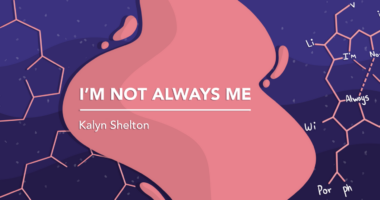Deciding Whether a Medication Is Worth the Potential Side Effects
Columnist Claire Richmond weighs the benefits and potential risks of Givlaari

On a sunny day last week, I was grateful for the energy to be able to enjoy an early autumn evening in the backyard.
My partner sat in the patio swing and the kids ran around in the grass. I wandered over to our small vegetable patch, where tomato plants still clung to their cages, their shiny balls of unripe fruit green on the vine. I kneeled down to peer under some foliage, inspecting the progress of a row of carrots. To my delight, they were ready to be harvested.
Our children are picky eaters, of the “peanut butter and jelly for every meal” variety. But earlier this year, I witnessed a miraculous dinnertime occurrence: They enthusiastically ate vegetables we’d grown together in the garden. I watched them pluck pieces of lettuce from a serving bowl with their fingers, delicately folding the leaves into their mouths, relishing in the crunch of fresh greens.
I called the kids over, then demonstrated how to follow the fluffy leaves of a carrot top to the small orange plugs waiting in the soil. I placed my hands on the carrots, as if asking the vegetables’ permission, before proceeding to snatch away the comfort of their dirt cocoons. Suddenly, I felt a catch at the tip of my ring finger, then a jolt of pain that radiated up my palm. I released my grasp on the carrot and pulled my gloved hand back, as if burned.
The exclamations of two kids harvesting carrots with their bare hands faded into the background, as I ripped off my garden gloves to examine my hand. Just as I feared, the fingernail of my ring finger had bent and cracked down to the quick. I touched the newly exposed redness and winced, thankful it wasn’t bleeding. Seconds later, dirty, misshapen orange vegetables were stacked in a small pile on my bare hand, their green ponytails trailing down.
Fourteen months ago, I started on Givlaari (givosiran), a new medication for acute hepatic porphyria (AHP). Among its list of side effects is hair and nail loss, a relatively benign set of symptoms in the grand scheme of things, but still uncomfortable, to say the least.
The value of good days
A joke among the chronic illness community is that we take one medication for our disease, and a cascade of additional drugs to manage resulting side effects. I never thought I’d be that person, but here we are.
I’m willing to go to great lengths to have a couple more “good days” every month. Because there’s no grief like that over lost time, especially the feeling of missing out on an event all your favorite people got to experience.
My body has automatically excluded me from countless adventures. I regularly find myself asking, “When did the kids get this?” Or I hear my partner talk about a story like we were all there and ask, “Where was I when that happened?” But I know the answer. It’s always the same.
When my family attended the state fair or went to see “Spider-Man: Into the Spider-Verse,” I was fighting to survive. On my own.
This year’s vegetable crop was possible thanks to plans made far in advance: seed-saving, composting, asking for help, and trusting that seasonal gardening days align with times I feel up to doing the work.
We took turns peeling carrots and did our best to cut their lumpy, pointed shapes into sticks. That evening, we served them on the side of air-fried chicken and potato chips. The kids agreed they were sweeter and more flavorful than any carrots they’d ever bought at the store. They almost polished off the bowl before I had a chance to eat any!
Weighing benefits vs. risks
Many hoped Givlaari would be a “wonder drug” for the prevention of acute attacks, but that’s not how I would describe my experience after the first year. I’m not concerned about nails breaking off, but there is a real threat of more serious, adverse events, such as pancreatitis or elevated homocysteine levels. Plus, with the lack of long-term data, other potential side effects are pure speculation at this point.
In recent months, I’ve experienced a couple more good days than I did before. If that’s the case, they come with a big risk, but it’s one I’m willing to take.
Note: Porphyria News is strictly a news and information website about the disease. It does not provide medical advice, diagnosis, or treatment. This content is not intended to be a substitute for professional medical advice, diagnosis, or treatment. Always seek the advice of your physician or other qualified health provider with any questions you may have regarding a medical condition. Never disregard professional medical advice or delay in seeking it because of something you have read on this website. The opinions expressed in this column are not those of Porphyria News or its parent company, Bionews, and are intended to spark discussion about issues pertaining to porphyria.








tess
Hey! i am 24 and ive been getting my injections every month since december 21. im so glad to read someone saying their experience wasnt the wonder drug it was promised to be. I need it to live, i know that if i go off of it my attacks are constant and worse. however i do still have attacks and the week leading up to my next dose i go into a really debilitating attack. sometimes this life makes me sad and tired, especially being sick like this for so long. i also sometimes get nervous about the long term side effects, especially the mental ones.
Claire Richmond
Hi Tess- You are definitely not alone with continuing to experience symptoms on Givlaari. With that said, I'm grateful it works well for some and also that it's one step closer to something that may help us find more stability. My attacks never stopped on Givlaari and since this article, I discontinued its use. After nearly a year, I have most of my energy back. We all have to make the best decisions we can for ourselves. I hope you have a medical team you trust. Thank you for reading and please keep posting! Sending hugs.